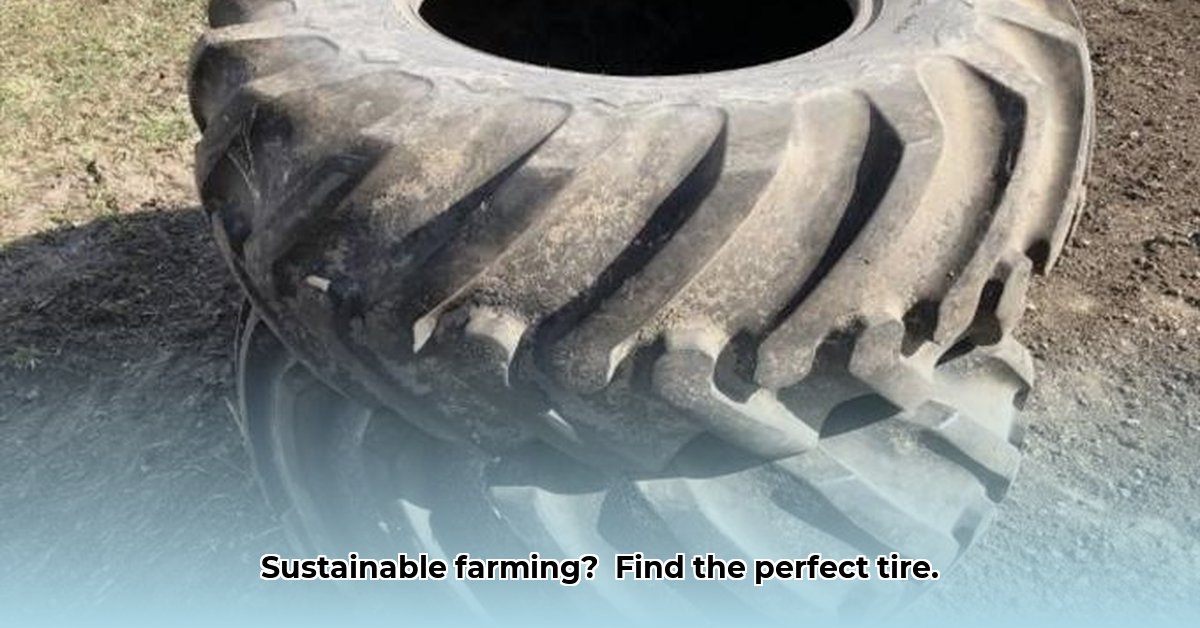
Choosing the right tractor tires is a critical decision for any farmer. The wrong tires can lead to reduced efficiency, increased fuel consumption, soil compaction, and even crop damage. This guide focuses on helping you select the optimal 16.9-24 tractor tires – a common size for larger agricultural operations – to maximize your farm’s productivity and sustainability. We'll cover tire specifications, selection criteria, maintenance, and sustainable considerations to guide you toward making an informed purchase. For more detailed information on 16.9-24 tires, check out this helpful resource.
Understanding 16.9-24 Tractor Tire Specifications
The "16.9-24" designation on your tire isn't just random numbers; it reflects the tire's dimensions. "16.9" indicates the tire's width in inches, while "24" represents the wheel diameter, also in inches. A larger number in this context means a wider and taller tire.
You'll also encounter other markings. "R4" denotes the tire's tread pattern, which is designed for general-purpose applications, providing a balance between traction in the field and smooth operation on roads. The "ply rating," often expressed as 12PR or 16PR for example, signifies the tire's construction strength and load-carrying capacity. A higher ply rating (e.g., 16PR) indicates a stronger, more durable tire capable of handling heavier loads.
Don't forget: The tire's load index shows the maximum weight it can carry at a specific inflation pressure. Always consult the specifications. Higher ply ratings often translate to higher load indexes and increased resistance to punctures and damage.
Choosing the Right Tire for Your Needs
Selecting the ideal 16.9-24 tire requires considering several factors specific to your farming operation:
1. Crop Type: Row crops like corn and soybeans demand tires that minimize soil compaction while providing sufficient traction. Orchards and vineyards, however, prioritize maneuverability and minimized crop damage. Heavy hauling operations need tires with high load-carrying capacities.
2. Soil Type: Sandy soils require different tire considerations than heavy clay soils. Sandy soils benefit from tires minimizing compaction, while heavy clay might need deeper treads for better grip.
3. Operational Priorities: Do you prioritize fuel efficiency, maximum traction, or extended tire lifespan? Radial tires typically offer better fuel efficiency due to lower rolling resistance. However, tires with higher ply ratings and aggressive tread patterns provide superior traction in challenging conditions.
Quick Guide:
- Row Crops (Clay Soil): Consider a higher ply rating (e.g., 16PR) R4 tire for enhanced traction and load-bearing capacity.
- Row Crops (Sandy Soil): An R1W tire (wide base) might be a better choice to minimize soil compaction.
- Orchards/Vineyards: Prioritize tires with a tread pattern that minimizes damage to plants and offers good maneuverability.
Tire Maintenance and Longevity
Regular tire maintenance extends their lifespan and improves your farm's operational efficiency.
- Pressure Monitoring: Maintain optimal inflation pressure as specified on the tire's sidewall. Underinflation increases wear and fuel consumption, while overinflation can cause damage.
- Rotation: Rotate your tires periodically to ensure even wear across all tires. This prolongs their useable life.
- Inspection: Regularly inspect your tires for cuts, bulges, or other damage. Address any issues promptly to prevent further problems.
- Storage: Store unused tires in a cool, dry location away from sunlight and extreme temperatures.
Sustainable Considerations
Choosing durable tires significantly reduces the environmental impact of tire disposal and replacement. By extending the tire's lifetime through proper maintenance and selecting high-quality tires, you minimize waste and contribute to sustainable farming practices. Look for recycling programs offered by your tire supplier. Responsible disposal is key to environmental stewardship.
Buying Guide and Resources
When purchasing 16.9-24 tires, consider these factors:
- Price vs. Quality: While the initial cost is a factor, prioritize long-term value. High-quality tires offer longer lifespan, reducing the overall costs.
- Reputable Dealers: Purchase tires from reputable dealers who offer sound advice and stand behind their products. Local dealers typically provide better support than online-only retailers.
- Warranty: Check the warranty offered by the manufacturer to protect your investment.
Remember, choosing the right 16.9-24 tractor tires is a significant investment. This guide provides valuable insights into selecting tires that optimize your farm's efficiency and contribute to environmentally responsible practices.